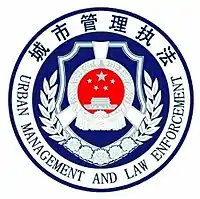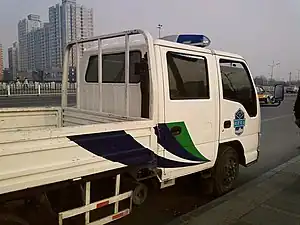Chengguan (agency)
Urban management and law enforcement (城市管理执法), colloquially shortened as Chengguan (城管; 'Urban management'), is an administrative practice of city-level local governments in China to oversee and manage city appearance and public environments according to the region's bylaws. The urban management bureaus are non-sworn civil agencies and are not entitled police powers.[1][2][3]
| 城市管理执法 | |
 |
| Urban Management and Law Enforcement | |||||||
|---|---|---|---|---|---|---|---|
| Simplified Chinese | 城市管理执法 | ||||||
| Traditional Chinese | 城市管理執法 | ||||||
| Literal meaning | Urban Management and Law Enforcement | ||||||
| |||||||
| Alternative Chinese name | |||||||
| Chinese | 城管 | ||||||
| Literal meaning | Urban Management | ||||||
| |||||||
.svg.png.webp) |
|---|
|
|
Although varied by region, the responsibilities of urban management are usually to maintain urban management order, sanitary environment and city appearance, and carry out urban management bylaw enforcement, environmental protection supervision and other work.[4][1]
According to an order from the Ministry of Housing and Urban-Rural Development in 2017, the scope of administrative penalties for urban management enforcement has been strictly limited to those specified in the laws, regulations, and rules related to the housing and urban-rural construction sector, as well as the administrative penalties related to environmental protection management, business administration, traffic management, water affairs management, and areas of food and drug supervision that pertain to urban management.[1]
History
The urban management and law enforcement bureaus were established in 2001/2002 for major cities in China to improve municipal governance as cities become more crowded and urban issues became more complex.
Criticism
The bureaus' employees are responsible for cracking down on unlicensed street vendors. According to the BBC, "Ever since the agency came into existence 10 years ago, there have been repeated criticism of them using excessive force. This de factor para-police bureau, equipped with steel helmets and stab-proof vests, is often used by local officials as trouble shooters".[5]
In general the Chengguan serve as a civil agency employed by cities across China "to tackle low-level illegal behaviors." However, the agency is widely disliked by the Chinese due to their abuses of power.[5]

Chengguan have been involved in several high-profile cases that highlighted public discontent towards a perceived abuse of power by Chengguan. One high-profile case involved Cui Yingjie, who killed a Chengguan in 2006 after a confrontation in Beijing. Public support for Cui Yingjie before and during the trial may have affected the leniency shown to Cui, who received a commuted death sentence.
Following an incident in Tianmen City, Hubei province in January 2008 in which the manager of a construction company, Wei Wenhua,[6] was beaten to death for filming the actions of the Chengguan in a local dispute over rubbish dumping, nationwide calls were made to abolish the unit. Thousands of messages were posted over the Internet and protests took place in Hubei province. According to sources, some Chengguan employees have connections to organized crime.
A 2012 report by Human Rights Watch documents Chengguan abuses, "including assaults on suspected administrative law violators, some of which lead to serious injury or death, illegal detention, and unlawful forceful confiscation of property."[7]
There were multiple cases in 2011 and 2012 throughout China where sworn police officers were attacked by groups of Chengguan employees when the police officers were responding to reported incidents of Chengguan's use of violence and abuse.[8]
In 2012, the Chengguan agency in Wuhan announced formation of an internal 'militia' or paramilitary-type division.
In 2013, a watermelon seller, Deng Zhengjia, was reported to have been beaten to death with his own scales by Chengguan. His body was protected by people on the street to prevent authorities from seizing it and to "preserve evidence." Violence ensued. Prominent microbloggers have called for the end to what has been termed a "thuggish" organization.[9]
In 2014, a man filming the Chengguan abusing a female street vendor was brutally beaten with a hammer until he was vomiting blood. He was pronounced dead on the way to the hospital. The five Chengguan officers were severely beaten, and four confirmed dead later,[10] with pictures posted on Sina Weibo.[11][12]
In popular culture
As a result of its notorious reputation, the Chengguan has become a popular target of jokes and internet memes by the Chinese public.
Time magazine reports that beatings by Chengguan employees have become such commonplace news that, "The word 'Chengguan' has even taken on an alternate meaning in Chinese. "Don't be too Chengguan" is an appeal not to bully or terrorize.[13] "The Chengguan is coming!", a phrase often shouted out by illegal street vendors to warn others to run away in case of a Chengguan inspection, has become a famous Chinese Internet punch line.
There are also satirical jokes of the Chengguan actually being China's secret strategic reserves, the "fifth branch of the PLA", because of their capability to cause "mass destruction". Punch lines such as "Give me 300 Chengguan, I will conquer..." and "China has pledged not to be the first to use Chengguan at any time or under any circumstances in order to keep world peace and stability" have gone viral among Chinese netizens in recent years.[14]
Administrative structure
The bureau is usually structured along two offices and six departments.[4][15][16]
- Administrative Office
- Comprehensive Management Department
- City Appearance Management Department
- Enforcement Management Department
- Legal Department
- Information Department
- Outdoor Advertisement Management Department
- Supervision Office
| Office/department | Chinese | Functions |
|---|---|---|
| Administrative Office | 办公室 Bàngōngshì |
Formulates annual work plan and meeting documentation, examines and approves various files and documents issued by the Bureau Controls the financial and assets management Security and administrative affairs Human Resources |
| Comprehensive Management Department | 综合管理处 Zōnghé Guǎnlǐ Chù |
Planning Organizing Liaising with county, city, district level departments |
| City Appearance Management Department | 市容管理处 Shìróng Guǎnlǐ Chù |
Supervises city appearance, street building, street scene appearance, street signs, booths, stalls, motor vehicle carparks Manages environment roadways |
| Enforcement Management Department | 执法管理处 Zhífǎ Guǎnlǐ Chù |
Municipal enforcement Issues fines and penalties Enforces local regulations and bylaws, settles municipal disputes |
| Legal Department | 法制处 Fǎzhì Chù |
Takes charge in drawing rules and regulation to urban management Assists city planners with legal framework and planning Hears and reviews litigation of administrative case |
| Information Department | 信息处 Xìnxī Chù |
Public communications about urban policies Informs community in regards to urban projects, regulations, policies and strategic vision |
| Outdoor Advertisement Management Department | 户外广告管理处 Hùwài Guǎnggào Guǎnlǐ Chù |
Sets policy, regulation and standards for outdoor advertisement, neon light, electronic screen wall and lamp box |
| Supervision Office | 监察室 Jiānchá Shì |
Supervises bureau employees, regulates conduct of public servants Investigates, verifies and resolves, appeal, prosecution and impeachment of employees |
See also
References
- 住房和城乡建设部 Ministry of Housing and Urban-Rural Development. "中华人民共和国住房和城乡建设部令(第34号)城市管理执法办法 – 2017年第28号国务院公报 – 中国政府网 Order of the Ministry of Housing and Urban-Rural Development of the People's Republic of China (No. 34) Urban Management Law Enforcement Measures – State Council Gazette No. 28, 2017 – China Government Web". 中华人民共和国中央人民政府 Central People's Government of the People's Republic of China. Archived from the original on 2023-10-11. Retrieved 2023-10-09.
- 住房城乡建设部 Ministry of Housing and Urban-Rural Development. "住房城乡建设部关于印发城市管理执法行为规范的通知 – 国务院部门文件 – 中国政府网 Notice of the Ministry of Housing and Urban-Rural Development on Issuing the Code of Conduct for Urban Management and Law Enforcement – Departmental Documents of the State Council – China Government Web". 中华人民共和国中央人民政府 Central People's Government of the People's Republic of China. Archived from the original on 2023-10-11. Retrieved 2023-10-09.
- Zhang, Lyuhao. "城市管理综合执法的法理与实践(上) Legal theory and practice of comprehensive law enforcement in urban management (Part 1)" (PDF). 北京市司法局 Beijing Municipal Justice Bureau. Archived (PDF) from the original on 2023-10-11. Retrieved 2023-10-09.
- "Summary of Urban Management". Urban Management Bureau of Suzhou Municipality. Archived from the original on 2008-11-21. Retrieved 2008-11-13.
- "China arrests over beating death". BBC News. 2008-01-09. Archived from the original on 2019-07-28. Retrieved 2010-01-02.
- http://www.shanghaidaily.com/article/shdaily_sing.asp?id=380290&type=National&page=0%5B%5D
- "Beat Him, Take Everything Away": Abuses by China's Chengguan Para-Police (Report). Human Rights Watch. May 23, 2012. Archived from the original on 2013-05-18.
- 河南遂平城管围攻警察 称警察干预城管执法 [Chengguan agents in Suiping, Henan province attacked police officers, claiming the police interfered with chengguan's law enforcement activity]. Xinhua News (in Chinese). November 4, 2011. Archived from the original on 2011-11-08.
- Makinen, Julie (July 19, 2013). "Slaying of watermelon seller triggers fresh anger in China". Los Angeles Times. Archived from the original on July 19, 2013. Retrieved July 19, 2013.
- Luo, Chris (2014-04-20). "Chengguan officials seriously injured after assault by large crowd". South China Morning Post. Archived from the original on 2014-04-20. Retrieved April 21, 2014.
- "China: "Violent Government Thugs" Beaten To Death By Angry Crowds After They Killed A Man Documenting Their Brutality". The Liberty Crier. April 20, 2014. Archived from the original on 2014-04-23. Retrieved 2014-04-22.
- "China: "Violent Government Thugs" Beaten To Death By Angry Crowds After They Killed A Man Documenting Their Brutality". Revolution News. 2014-04-19. Archived from the original on 2014-04-23. Retrieved 2014-04-22.
- Ramzy, Austin; Yang, Lin (May 21, 2009). "Above the Law? China's Bully Law-Enforcement Officers". TIME. pp. 24–25. Archived from the original on May 25, 2009.
- "城管部队就是牛叉啊". Archived from the original on 2016-01-20. Retrieved 2017-04-02.
- "Main Functions". Beijing Municipal Bureau of City Administration and Law Enforcement. Archived from the original on 2008-10-30. Retrieved 2008-11-17.
- "Zhongshan Urban Management and Law Enforcement Bureau". The Official Website of Zhongshan, China. 2008-10-15. Archived from the original on 2011-07-07. Retrieved 2008-11-17.
External links
- Article 16 and Article 17 of the Law of the People’s Republic of China on Administrative Punishment
- Article 17, paragraph 2 and Article 70 of the Administrative Compulsion Law of the People’s Republic of China
- Regulations of Shanghai Municipality on Administrative Law Enforcement in Urban Management
- Local People's Congress and their Standing Committees, the People's Republic of China
- Article 106 of the Civil Servant Law of the People's Republic of China
- Procedures of the Administration of Shanghai Municipality Administrative Law Enforcement Certificate
- Article 10 and Article 11 of the Regulations of Shanghai Municipality on Sub-district Offices
- English News articles about Chengguan
- Above the Law? China's Bully Law-Enforcement Officers - TIME magazine
- Human Rights Watch report: “Beat Him, Take Everything Away” Abuses by China’s Chengguan Para-Police
- China's 'para-police' brutality under scrutiny - Christian Science Monitor, via YAHOO! News